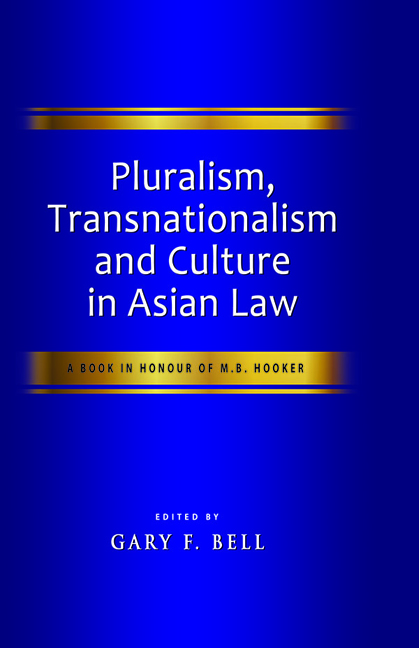Book contents
- Frontmatter
- Dedication
- Contents
- Preface
- Acknowledgements
- About the Contributors
- Chapter 1 M.B. Hooker and Southeast Asian Law: Path-breaking Passions
- Chapter 2 Asian Thought and Legal Diversity
- Chapter 3 Comparative Law, Anti-Essentialism and Intersectionality: Reflections from Southeast Asia in Search of an Elusive Balance
- Chapter 4 Legal Pluralism and Legal Anthropology: Experiences from Indonesia
- Chapter 5 Mapping the Relationship of Competing Legal Traditions in the Era of Transnationalism in Indonesia
- Chapter 6 Indonesia's Weak State Courts and Weak Law Fare Poorly in a Pluralist Commercial World
- Chapter 7 When Laws Are Not Enough: Ethics, Aesthetics, and Intra-Religious Pluralism in Contemporary Indonesia
- Chapter 8 Legal Pluralism and the Constitutional Position of East Malaysia's Indigenous Peoples: The View from the Longhouse
- Chapter 9 Sharia, State and Legal Pluralism in Indonesia: How Law Can You Go?
- Chapter 10 Negotiating Legal Pluralism in Court: Fatwa and the Crime of Blasphemy in Indonesia
- Chapter 11 Islamic Law in Israel: A Case Study in Legal Pluralism
- Chapter 12 The Road to Democracy Goes Through Religious Pluralism: The Indonesian Case and Thoughts on Post-Mubarak Egypt
Chapter 6 - Indonesia's Weak State Courts and Weak Law Fare Poorly in a Pluralist Commercial World
Published online by Cambridge University Press: 12 January 2018
- Frontmatter
- Dedication
- Contents
- Preface
- Acknowledgements
- About the Contributors
- Chapter 1 M.B. Hooker and Southeast Asian Law: Path-breaking Passions
- Chapter 2 Asian Thought and Legal Diversity
- Chapter 3 Comparative Law, Anti-Essentialism and Intersectionality: Reflections from Southeast Asia in Search of an Elusive Balance
- Chapter 4 Legal Pluralism and Legal Anthropology: Experiences from Indonesia
- Chapter 5 Mapping the Relationship of Competing Legal Traditions in the Era of Transnationalism in Indonesia
- Chapter 6 Indonesia's Weak State Courts and Weak Law Fare Poorly in a Pluralist Commercial World
- Chapter 7 When Laws Are Not Enough: Ethics, Aesthetics, and Intra-Religious Pluralism in Contemporary Indonesia
- Chapter 8 Legal Pluralism and the Constitutional Position of East Malaysia's Indigenous Peoples: The View from the Longhouse
- Chapter 9 Sharia, State and Legal Pluralism in Indonesia: How Law Can You Go?
- Chapter 10 Negotiating Legal Pluralism in Court: Fatwa and the Crime of Blasphemy in Indonesia
- Chapter 11 Islamic Law in Israel: A Case Study in Legal Pluralism
- Chapter 12 The Road to Democracy Goes Through Religious Pluralism: The Indonesian Case and Thoughts on Post-Mubarak Egypt
Summary
The seminal work of M.B. Hooker on legal pluralism needs no introduction. As its title indicates, his book, Legal Pluralism – An Introduction to Colonial and Neo-Colonial Laws, published in 1975, studied the forms of legal pluralism that are the result of Western colonialism. Hooker distinguished the plurality of sources of law within most legal systems from the legal pluralism of colonial and post-colonial systems which is characterized by the transplant of whole Western legal systems across cultural and religious boundaries. He wrote:
LEGAL systems typically combine in themselves ideas, principles, rules, and procedures originating from a variety of sources. Both in the contemporary world and historically, the law manifests itself in a variety of forms and at a variety of levels. This fact has of course been known for a good many centuries and jurists have given it a considerable amount of study within their respective systems of law. The purpose of this book is not to repeat existing work on the diverse origins and legal ideas within civil law, common law, or socialist law systems but to describe the systems of legal pluralism in the contemporary world which have resulted from the transfer of whole legal systems across cultural boundaries. This process began in the seventeenth century with the expansion of the civil law and common law systems outside Europe and reached its greatest extent in the nineteenth and twentieth centuries. The laws with which the ‘Western’ laws came into contact included the great ethical and religious systems as well as numberless varieties of unwritten laws. The result has been that large portions of the globe are subject to laws the principles of which are drawn from a number of widely differing cultures.
M.B. Hooker pointed out what was in fact new about this form of legal pluralism: the prominence of the idea of the state as the source of law – in the Western concept of law, the state is the ultimate source of law and other laws can only apply if the state allows it.
- Type
- Chapter
- Information
- Pluralism, Transnationalism and Culture in Asian LawA Book in Honour of M.B. Hooker, pp. 116 - 150Publisher: ISEAS–Yusof Ishak InstitutePrint publication year: 2017

